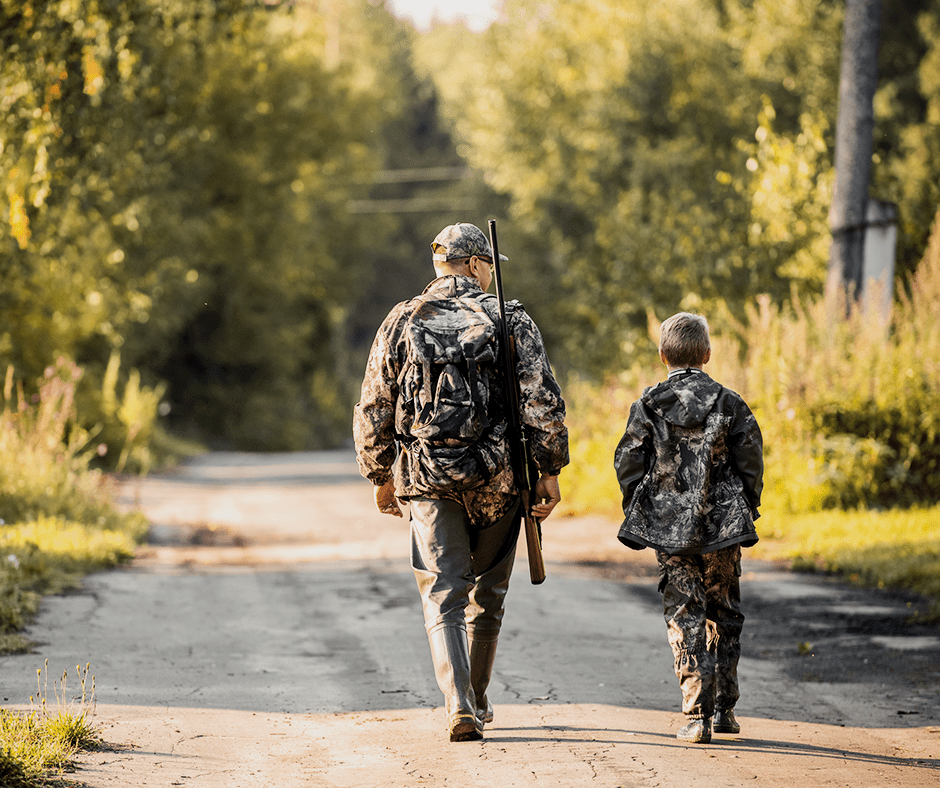If you love hunting, you’ll know there’s no better sport for kids for getting exercise, learning self-reliance, or having fun. You’ll also know that there are few sports that are as dangerous, difficult, or potentially boring as hunting. If you’re considering taking your children on a hunt, make sure to avoid the following pitfalls.
1. Forgetting your kids are kids:
While hunting, parents often use the same standards for their children that they expect adult hunters to follow. This is a mistake. Children cannot be expected to travel as far, walk as quickly, or endure the same extremes of heat and cold as adults. If you berate your kids for not enduring everything you can endure, you’re guaranteed to make them hate hunting.
Remember also that children can’t hunt as responsibly as you can– and that’s okay. Children lose things, speak when they should be silent, and fail to adequately camouflage themselves. Be prepared for this. Understand that you might not be able to hunt as many animals, and that you may have to replace some of your equipment. If you can’t prepare for this, the hunt will be miserable, both for your child and for you.
2. Keeping your kids in the dark:
When planning the hunt, involve your kids directly. Explain to them why you’re hunting the game you’re hunting, and what steps you’ll have to take to hunt it. This will help them to contribute to the hunt and to stay safe. It will also make the experience more fun for them. Long treks through the woods are less likely to seem boring and tiring if your children understand that they’re part of an importance process. Which brings us to our next point…

3. Forgetting to have fun:
Kids just don’t have the same attention span as adults. What may seem like a reasonable wait for you is an eternity for your child. Break the cycle of boredom. Come up with games to play while you’re waiting. One option is to compete with your kids to identify different kinds of birds or plants. This will help fill the time, and it will teach your kids about the local wildlife, helping them to hunt more effectively.
To ensure that your hunt is rewarding and enjoyable, you may have to select a different kind of wild game to hunt than the type you would pursue on your own. Don’t hunt for deer the first time you take your kids with you. A deer may look more impressive, but you’re also less likely to successfully find and kill one on any particular hunt, and your kids won’t like coming home empty-handed. Instead, focus on rabbits, squirrels, and other small game, which are more abundant.
4. Failing to stay safe:
As a parent, you should already know not to put your kids in a position that could threaten their lives or health. Before taking them hunting, make sure they’re well versed in the dangers of the woods, and know how to avoid harm. If you’re going to let your kids use weapons, make sure they’ve passed the necessary training classes. Most states offer hunters’ safety courses and youth hunting educational classes through their conservation departments. It is also very important for parents and mentors to work on safety outside of the hunter education classes. The practice will help them get used to the proper handling of firearms. Proper handling includes storage, use, safety precautions, loading and unloading and shooting targets.
Teach them how to identify dangerous plants and keep them a safe distance away from dangerous animals. Make sure your children know how to build a fire and find shelter in case they get separated from you.
Finally, make sure that your kids know how to swim. Far more hunters drown than die from gunshot wounds.
5. Forgetting to teach them respect for the animal and the environment:
Hunting with kids can also teach them how to respect the animal(s) they are hunting. When kids watch game being cleaned and processed, they get a sense of where their meat comes from and that it was a once-living animal. It also teaches them how to properly care for an animal after it’s been harvested and how to utilize all of the meat from an animal that gave its life. It is important that they understand that if they eat meat, it comes from an animal. Living by the rule “if you kill it, you eat it” will help them understand that animals are respected and the meat is not wasted.
The role that hunters play in conserving wildlife does two main things: it acts as a funding source for state agencies that help conserve habitat and secondly it helps control populations that may have population explosions or disease. It is important for children to understand the balance they play in conserving the wildlife populations and the habitat they live in will help them preserve the hunting tradition for future generations.
6. Lack of respect:
If you take your kids hunting, the main goal should be to make them happy. Never pressure them to go hunting with you; only take them if it’s what they really want to do. While hunting, don’t make them use weapons until they feel comfortable. If your kids feel sad about killing an animal, or frustrated about not killing anything, respect their emotions. Always listen to your children’s suggestions and complaints, and take them seriously. If you ignore your children’s feelings and treat them like nuisances, odds are they’ll never want to hunt with you again.

Leave A Comment